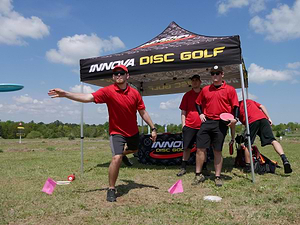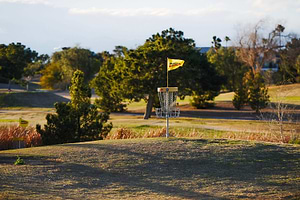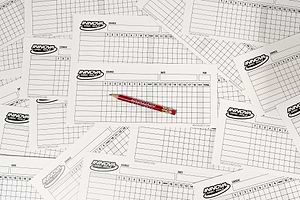Disc Golf Terms: Learn the Language to the Sport
TOC
Table of Contents
Break through the disc golf language barrier with our comprehensive disc golf terms dictionary. We’ve done our best to cover every disc golf related word, term, and phrase.
(*Each category is organized alphabetically)
Disc Golf Throws
There are many different throw types you can use to get a disc from the tee box and ultimately in the basket. Here are some throw disc golf terms you might hear on the disc golf course and some throwing styles you might want to try for yourself.
Approach Shot: Shorter throws aimed at the green using a mid-range disc or putt and approach disc for control and accuracy.
Backhand: A backhand throw is the most commonly used in disc golf, where you pull the disc back across your body and follow through with your lead shoulder initially turned away from the target.
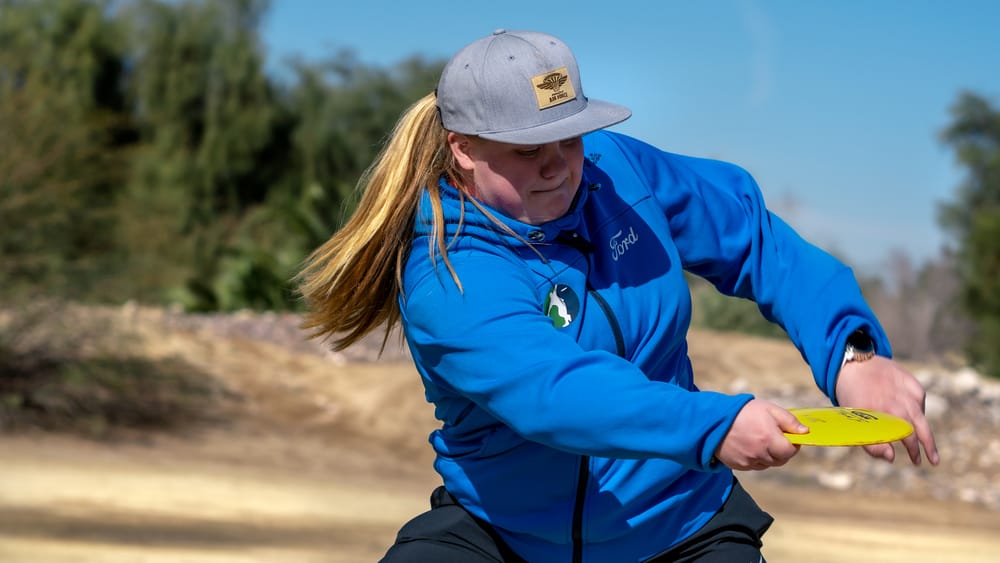
Common Abbreviations: The following are often used when explaining throwing motions.
- LHBH: Shorthand for left-hand backhand throw.
- LHFH: Shorthand for left-hand forehand throw.
- RHBH: Shorthand for right-hand backhand throw.
- RHFH: Shorthand for right-hand forehand throw.
Chicken Wing: Throw used with either arm that’s essentially using the opposite throwing motion of a backhand shot. Used for special circumstances and not recommended for beginners.
Drive: This is your tee shot. A player tees off from a designated teeing area (tee pad) for their drive. Longer holes like par 4 and par 5 holes often require multiple drives.
Escape Shot: Often from a tough lie (like deep in the woods), you are scrambling to escape from a bad lie to either simply get back in the fairway or to “go for it” and reach the basket.
Fairway Shot: For this shot, whether a drive or approach, emphasis is placed on landing in the fairway rather than distance. Often considered a safe shot, a fairway shot may not yield a birdie, however it often steers you clear of bogeys or worse.
Flex Shot: A flex shot (or “force flex”) is when you throw an overstable disc like a Firebird on an anhyzer release angle with a lot of power. You force the disc to turn over and glide out before it ultimately fades because of its natural overstability. It is a good control shot to shape lines through woods and around obstacles.
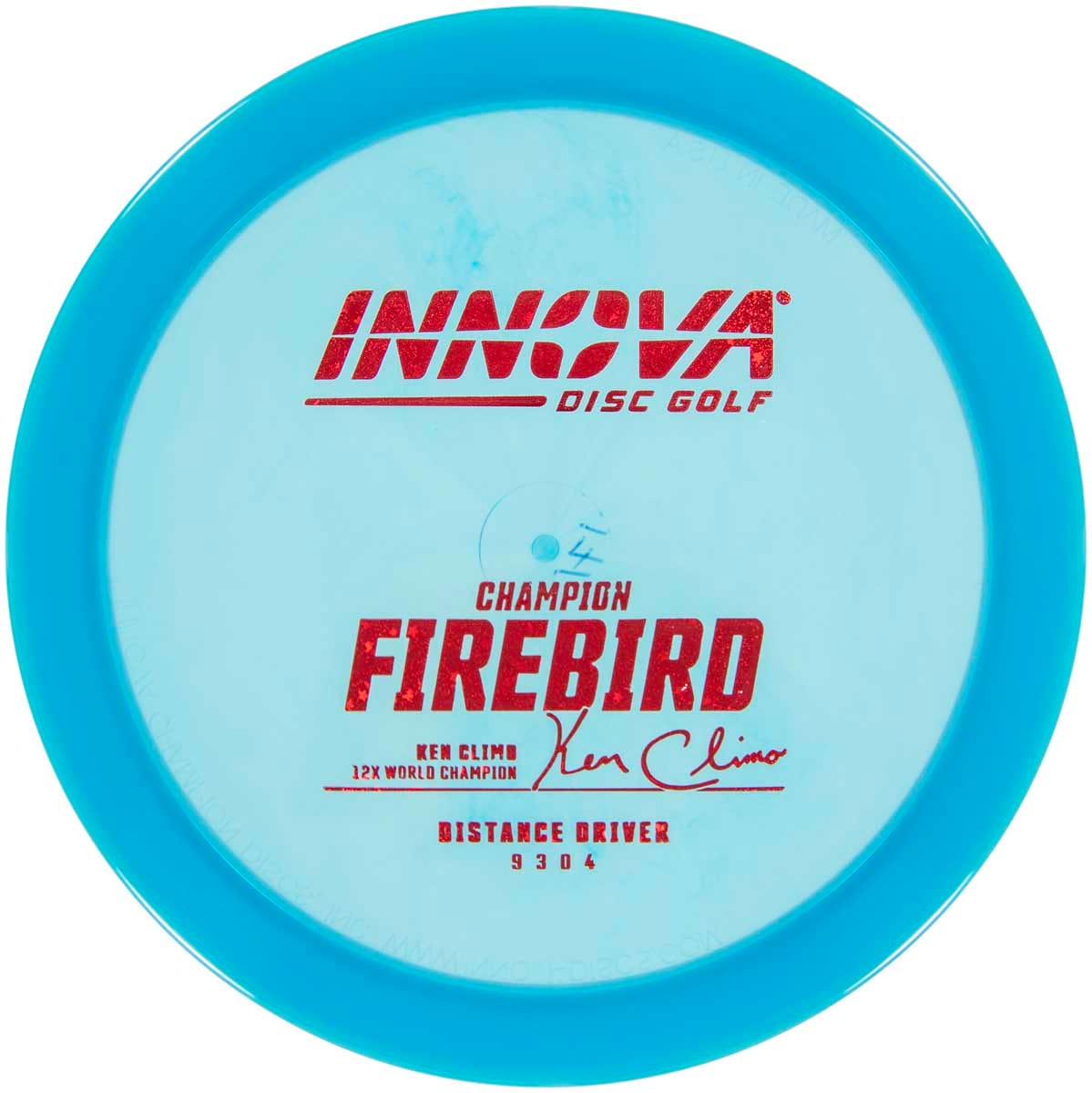
Innova Champion Firebird
World’s Most Popular Overstable Driver
Whether it’s spike hyzers, flex shots, or a predictable forehand, the Innova Firebird has the overstability and the incredible track record to make them all happen with ease.
Forehand: – Similar motion to a tennis forehand, the disc golf forehand is performed when you are facing the target and the disc is thrown with the opposite rotation of a backhand. Also known as a “flick,” the forehand has become more prevalent in recent years.
Grenade: A grenade shot is essentially a backhand throw gripping the disc upside down. An overstable disc is used to get a straight up and down flight while a very understable disc can be used to get a corkscrew shape that eventually glides out.
Hyzer Flip: The type of disc is important for this shot. The hyzer flip is achieved by throwing a more understable disc on a hyzer angle of release. Ideally, it will flip to flat and then glide out nicely down the fairway. These forehand or backhand throws will typically improve maximum distance.
Overhand Shot: This is when you throw the disc with a vertical overhand motion like a baseball pitcher or at an even more exaggerated angle over the top of your head. Here are a few examples:
- Hammer: This is a variant on a tomahawk style shot, though usually thrown with a putter or slower-speed disc that you want to pan out and land flat on its top. It is thrown directly over your head at an exaggerated angle. Also sometimes known as a “pancake” putt to get over obstacles on the green.
- Tomahawk: A tomahawk is an overhand shot thrown with a forehand grip. It can be thrown at various overhead angles and with different disc stabilities to achieve controlled flight characteristics (usually a unique corkscrew shape).
- Thumber: A thumber is similar to a tomahawk overhand throw, except the disc is gripped upside-down with your thumb under the rim. It will provide the opposite flight path as a tomahawk throw.
Putt: In purely technical terms, a putt is a stand-still throw within 10 meters or less. You would usually use a slower, blunt-edged putt and approach disc like an Innova Aviar. Some players may still use a standard or altered putting motion from outside the 10-meter circle that most would still consider a “long putt.” (More on putts in Disc Golf Putting Terms)
Roller: Sometimes it can be beneficial to purposely roll the disc for extra distance or when escaping a tough lie. There are backhand rollers that you throw at an extreme anhyzer release angle (disc tilted up and away from your body) and you will usually utilize understable discs. You can also throw forehand/overhand rollers with a forehand grip. Overstable discs are usually best for forehand rollers.
- Cut Roller: Most roller shots will flip up and roll the direction the flight plate of the disc is facing (meaning righty backhand rollers will want to finish to the right and righty forehand rollers will want to finish left). You can also roll the disc at a sharper angle and use a more overstable disc to achieve a “cut roll” that will tend to hold the opposite direction if thrown properly. Cut rollers are usually more for controlled upshots and getting around obstacles than for pure distance.
S-Shot: Also known as a “helix,” this is when you throw a more understable disc like a Mamba on a flat or slight anhyzer angle. It will usually produce a similar S-shaped shot as a flex, but the disc is doing all the work. An understable disc can be thrown with less power to achieve a helix compared to an overstable disc that requires more power to turn over.
Scramble: When one or more of your throws is off the fairway and you are able to save at least a par.
Scoober: This is an even more exaggerated hammer-type putt that is thrown from somewhere between your head and your off-hand shoulder. The scoober is a type of throw that can provide good control and usually stays close to the basket if you miss.
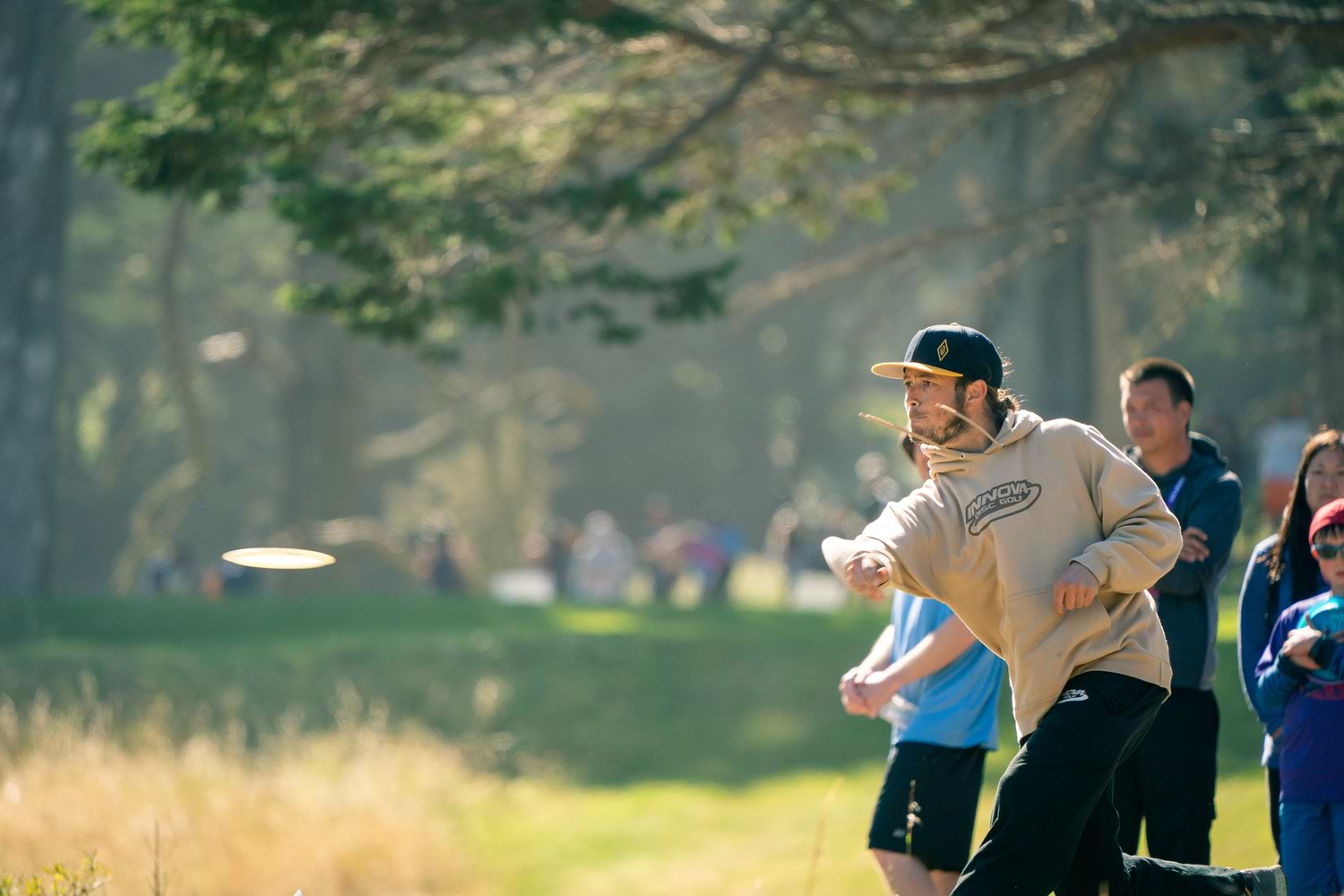
Sidearm: Same as Forehand.
Skip Shot: A backhand of forehand shot with the goal of achieving a large skip at the end of the throw. Usually accomplished with a heavy hyzer angled release aimed extremely low – which sends the disc to the ground much sooner than usual and produces a big skip. Great for holes with hard turns.
Spike Hyzer: This is when you throw a disc on an extreme hyzer angle of release with a regular backhand grip. It will offer lots of control, allow you to get over and around fairway obstacles, and the disc will typically “spike” into the ground rather than skip. A favorite for professional disc golfers.
Straight Shot: The 300-foot straight shot is considered to be one of the toughest shots in disc golf. Master it and most of the game will be within your reach. It’s best accomplished with fairway drivers or trusted Mid-Range Discs.
Upshot: Similar to approach. Shot short in length to green.
Disc Flight Characteristics
Describing how a disc golf disc flies can be tricky, but over the years a special disc golf language has been created to explain how discs fly. Here are some of the most handy disc golf terms that deal with disc flight:
Anhyzer: This is the opposite release angle of a hyzer throw, where the disc is tilted upward toward you as you release, resulting in a flight that drifts initially to the right (RHBH). For more information, see our article explaining more about the intricacies of Hyzer vs. Anhyzer throws.
Fade: When a disc loses power it fades to the ground. How quickly it veers to the ground depends on how much fade its packed with. A Firebird with a fade of 4 will curve to the ground much sooner that a Leopard with a fade of 1. Fade is one of the four disc flight numbers.
Glide: This refers to the natural glide of the disc, as in how long it tends to stay in the air on average throws. Discs with a lot of glide may provide more distance with less effort, but they don’t offer as much control as discs with lower glide ratings. Glide is one of the four disc flight numbers.
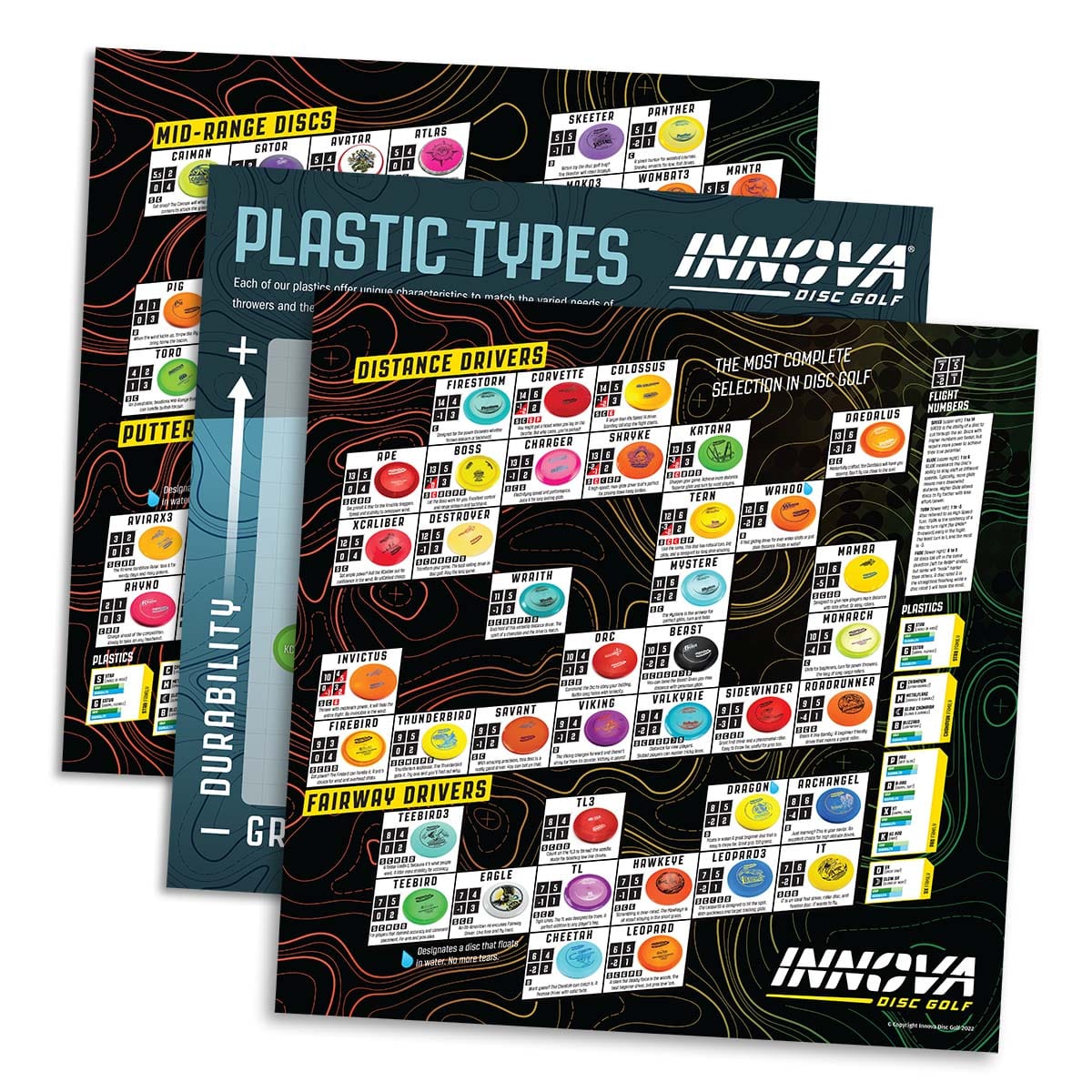
Hyzer: This refers to the release angle of your disc when it comes out of your hand. A hyzer throw will have the disc angled downward and will typically result in a flight that fades out to the left on RHBH throws.
Max Weight: Per PDGA rules, disc golf discs are required to conform to maximum weights (measured in grams) based on the diameter of the disc mold. This is why large diameter discs like the mid range Roc3 can have a max weight of 180g while drivers and other small diameter discs max out at 175g. All Innova discs are hand-weighed and marked with their weight (or weight range) before leaving the factory.
Overstable: Overstable discs, known to have high fade and limited glide, are used for control and a predictable flight designed to fight back to the left on RHBH throws.
Speed: This is the first flight number you will see listed on Innova discs. The speed of a disc is how fast it must be thrown to achieve its designed flight characteristics. The higher the speed, the faster the disc. Putters and approach discs (mid-ranges) are the lowest-speed discs.
Stability: This refers to this disc’s ability to maintain the line that it is thrown on. Different discs are engineered with different levels of stability, from overstable to stable to understable.
Turn: This refers to the initial high-speed understability of the disc, meaning how much it wants to initially drift to the right on RHBH throws. Turn is one of the four disc flight numbers.
Understable: Understable discs (or Flippy discs) will naturally want to pan out right on RHBH throws. The faster the disc is thrown, the more it wants to turn.
Weight: All discs are marked with a weight measured in grams. Lighter-weight discs require less power to get up to speed, but can also be harder to control. Heavier discs will fight the wind better and offer more control, but take a little more effort to throw for max distance. For a closer look at how weight affects discs and throwing check out our Disc Weight blog.
Disc Golf Putting Terms
No matter how far you can throw, you still have to make putts to compete at a high level. Because putting is its own little ecosystem within disc golf, it has a lot of disc golf terminology just for it. Here’s a quick list of the keywords.
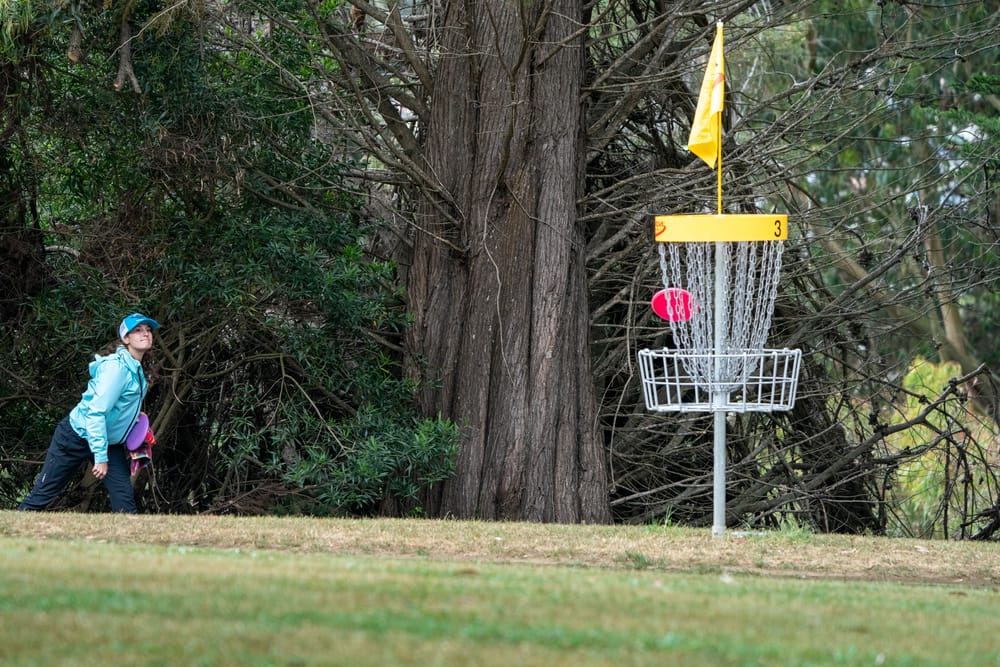
Anhyzer Putt: For an ‘Anny’ putt, the left side of the disc is tilted upward (for RHBH putt) and flies on a left to right path toward the basket. Some players prefer to putt with an anhyzer release while others may only use it to get around obstacles.
Blow Through: A bad luck putting scenario where your disc hits the chains, but somehow slips through them all resulting in a miss.
Comebacker: A comeback putt is when you miss your first putt and are left with a follow-up putt attempt. Often comes with the additional pressure of losing even more strokes.
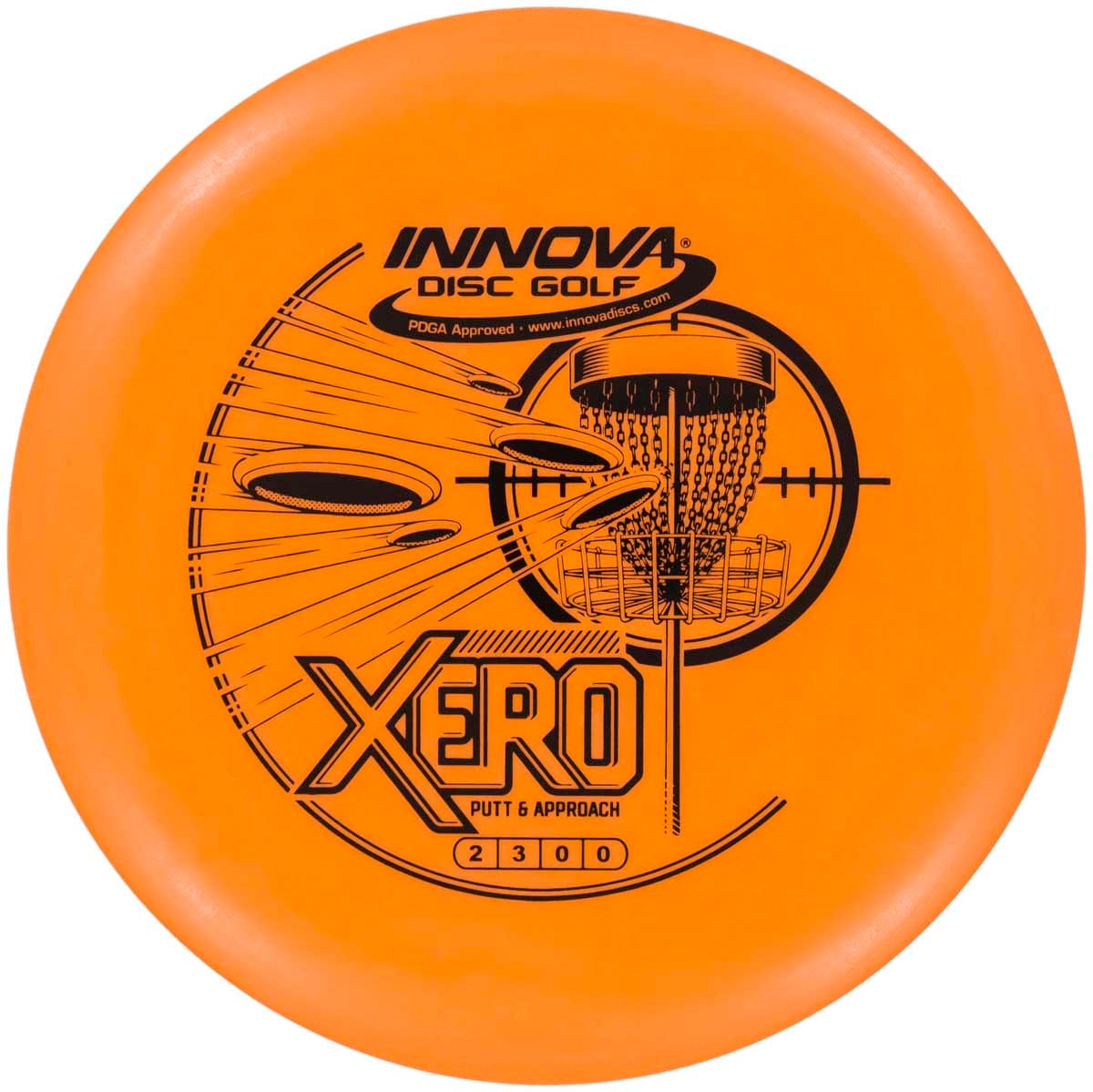
Innova DX Xero Putt & Approach
Super Straight, Go-for-it Disc
Stable, straight, and true, the Innova Xero is a perfect ten when it comes to dialing-in putts and threading your way to the green.
Foot Fault: Within circle 1, a foot fault is when any part of your body (foot, hand or otherwise) lands past your lie during or after releasing the disc. Outside of circle 1, foot faults can happen if you take an improper stance or your plant foot is not planted within the permitted area behind the disc or mini marker. A foot fault, if called and seconded by at least two members of your card, will add a one-stroke penalty to your score.
- Falling Putt: Another term for a foot fault within circle 1 where you step through or fall forward illegally and incur a one-stroke penalty throw. Read our blog to learn how to avoid a falling putt.
Holing Out: This is when you have officially “holed out” on a disc golf hole, with your disc having come to rest in the basket tray or the chains. The hole is only considered completed when each player has properly holed out.
Horseshoe Putt: This is more of an underhand style shot from the hip, usually thrown with a putter to get over or around an obstacle on the green.
Hyzer Putt: This refers to a putting style where you throw the disc on a hyzer angle (with the left side of disc is tilted down and away from your body for a RHBH) and play the natural curve in the air to control your putt.
Jump Putt: When you are outside circle 1, you are allowed to jump putt as long as your plant foot is still on the ground at the moment you release the disc. After the disc is released, the jump forward can provide extra momentum.
Lay Up: A conservative toss to ensure your next throw is an easy putt. This is often done in heavy winds, or tricky greens where a missed putt could lead to costly extra strokes.
Push Putt: A putting style where your arm acts more as a pendulum and you “push” the disc out of your hand without much spin. It may float up and drop into the basket or wobble a little to catch the chains softly.
Roll Away: This bit of bad luck occasionally happens after a missed putt hits the ground on edge and rolls away down noticeably.
Running It: When you are faced with a long putt or scary tester, and you attempt an aggressive bid at making the putt.
Spin Putt: A putting style where you impart more spin on the putt as you release the disc, usually with the goal of throwing it as straight as possible into the basket. A spin putt will generally enter the basket with more speed.
Spit Out: This is when you hit the chains solidly on a putt (or any throw), but the chains fail to direct the disc into the basket.
Spush Putt: Somewhere in between a spin putt and push putt style. Many disc golfers naturally have a “spush putt” that blends some elements of a spin putt and some elements of a push putt.
Step Putt: An alternative putting method for longer putts outside circle 1. For this throw, you step through with the foot that is not planted at the lie, again with an objective of gaining extra momentum on your putt.
Straddle Putt: A straddle putt is a style of putting stance where both feet are parallel with the basket, usually spread out to provide balance or to help throw around an obstacle on the green (such as a tree or bush). Some disc golfers prefer to use a straddle-type putt for all putts.
Stagger Stance: An alternative to the straddle stance, this is when one foot is positioned somewhere behind the other to provide better balance or allow for a rocking motion that can help generate a little more momentum.
Tap-In: When you are so close to the basket on a putt that you can simply drop it in the tray.
Tester: A tester is any putt that is outside your personal “comfort zone.” It’s one that’s makeable, but becomes much harder in a pressure packed, competitive situation.
Turbo Putt: An unorthodox putting form that consists of holding your disc above your shoulder with your fingers on the back of the rim. The disc is thrown with a pushing motion (similar to tossing a football) toward the target. It is a good utility putt when you have to putt over objects.
Disc Golf Grips
There’s no one way to grip a disc. This next disc golf term section explores the many grips that can be used for various situations.
Backhand Grip: The standard way to grip a disc. It starts with your thumb on top. The placement of the rest of your fingers depends on what kind of backhand grip you employ.
- Fan Grip: A fan grip is a type of backhand grip with one or more of your fingers “fanned out” underneath the disc as opposed to gripping the inside of the rim. It is good for more control and is commonly used for when you get closer to the disc golf basket, typically putting.
- Power Backhand Grip: A power grip for a backhand throw will have your fingers (except thumb) all gripping the inside of the rim firmly to impart more spin and speed when you release the disc.
Forehand Grip: A forehand (or sidearm) throw will have your thumb on top of the disc (or sometimes along the edge for some players). The most common forehand grip is the “stacked” style with your middle finger on the rim and your index finger against it for control and power.
- Power Forehand Grip: This is an alternative forehand grip where the index finger is bent and putting direct pressure on the inside of the rim to enhance the normal pressure from the middle finger.
Thumber Grip: When throwing a thumber or grenade shot, you will grip the disc upside down with your thumb inside the rim. There is also a “hook” thumber grip variation where you put your index finger over the top of your thumb to apply more pressure or add control.
Tomahawk Grip: Similar to a regular forehand grip where the middle finger is pressed against the rim and the index finger is stacked on top.
Disc Types
There’s more than one type of disc golf disc. This section will explain the main types and other important info related to them.
Distance Drivers: These are the fastest discs designed to spin faster and fly farther when thrown at full power. Typically used on holes longer than 300 feet. When looking at disc speed ratings, these discs are rated with a speed of 9 or higher—meaning everything from a 9-speed Thunderbird to a 14-speed Corvette are in our distance driver lineup.
Fairway Drivers: Fairway drivers are regarded as dependable, accurate flyers that help keep you out of trouble. Innova typically categorizes discs in the 6-8 speed range as “fairway drivers.” Innova’s most popular fairway driver disc molds include the Leopard3, TeeBird3 and Eagle X.
Frisbee®: The word Frisbee® is a patented term registered by the Wham-O company. Disc is the accepted term for the flying objects thrown for disc golf. Frisbee® Golf is considered to be an outdated reference to the game of disc golf. Check out our blog for more information on the history of disc golf.
Mid-Range Discs: Mid-ranges are slower-speed discs in the 4-5 speed rating range. They are primarily used for approach shots (upshots) and controlled tee shots on shorter disc golf holes. Many mid-ranges are large diameter in size (slighter larger in diameter than other golf discs).
Mini Marker Disc: After throwing a shot, a player may mark their lie by placing a mini marker disc immediately in front. This allows the player to use the same disc previously thrown.

Mold: This refers to the specific design of any given disc. The plastic is literally molded into the shape of a particular disc at the factory.
Putt & Approach Discs: The slowest discs (speeds 1-3) are considered “putt and approach” discs. These discs are easy to control at short distances. Skilled players will also throw putters at full power for ultra-controlled tee shots and longer upshots.
Super Class: Innova produces a lineup of “super class” discs (as categorized by the PDGA) like the Zephyr, Condor and Makani. These extra-large diameter discs can come in handy for disc golf (old-timers swear by them). Or, they can also make for good warm-up discs, or just fun on the beach.
Ultimate Discs: Not a disc designed for disc golf, but rather for the sport of Ultimate Frisbee. These are larger discs (more like oversized beach Frisbees) designed for maximum glide and catchability.
Bonus Disc Terms:
Rings of Headrick: This advanced level disc golf term refers to the raised grooves or lines on the top side of Fastback type discs like the Innova Sonic or the Innova Alien. Steady Ed Headrick, one of the pioneers of disc golf, patented those grip aiding grooves when he worked at Wham-O several decades ago.
Tooling: This refers to the engraved identification on the underside of a disc’s flight plate. It varies among disc manufacturer. In most cases the tooling shares the maker of the disc, the manufacturer’s website, and where the disc was made. For Innova that would be: “INNOVA CHAMPION DISCS, INC”, “WWW.INNOVADISCS.COM”, and “USA”. The exact wording can vary depending on disc model and year. Some tooling is used by disc collectors to determine the mold of certain discs like the Roc, in which different versions of the disc are identified by tooling indicating where the disc was made in California: “RANCHO CUCAMONGA” or “SAN MARINO” or “ONTARIO”. Learn more abour Roc history on our Innova Roc page.
Disc Golf Course Terms
The disc golf course is fairly straight forward if you’re approaching it as a rookie. Here are some course disc golf terms that will ensure you know your way around.
Basket: Basket refers to the metal target that acts as the ‘hole’ for a disc golf course. At about 4.5 feet tall, the basket consists of a pole (often installed into the ground), an actual metal basket halfway up, and several layers of chains to catch discs thrown at it. A player completes a hole by having their disc successfully come to rest inside the target’s basket. Most full-size courses will have 18 baskets (or holes). Take a look at our blog for a detailed overview on how to install a permanent disc golf basket.
Fairway: The fairway is the most desirable area for your disc to travel through and to land (provided the green is too far to reach from the tee).
Green: Some will refer to a disc golf green as another term for circle 1. In general, it is the terrain directly around the basket. When you hear someone talking about a “fast green,” they are referring to the ground itself. It may be sloped or have hard turf that leads to enhanced skips and roll-aways. A “slow green” might be one with relatively deep grass, sand, soft dirt or wood chips that will stop the disc faster.
- Circle 1: This refers to the area within 10 meters (roughly 33.3 feet) directly around the basket. Once your disc is inside circle 1, you may not step through or let any part of your body touch the ground in front of your lie during or after your throw. You must demonstrate balance and bodily control until the disc has come to rest within the basket or chains.
- Circle 2: This refers to the area within 20 meters (roughly 66.6 feet) directly around the basket. Many disc golf tournaments will mark off both circle 1 and circle 2 for player reference. Once you are outside circle 1 (within circle 2 or beyond), you are allowed to step or jump-through after you release the disc.
Pole Hole: When disc golf was in its infancy as a sport, players would throw at designated trees and other objects to act as ‘the hole’. Later “Steady” Ed Headrick invented disc golf’s first target, the Pole Hole which ushered the game into a new era.
Rough: The rough are the undesirable areas of each disc golf course that usually surround the fairway and green.
Tee Pad: A tee pad is a designated area where each hole begins. Tee pads can be constructed from actual materials like concrete, artificial turf, or gravel. In some cases, the tee off area is simply marked on the natural ground.
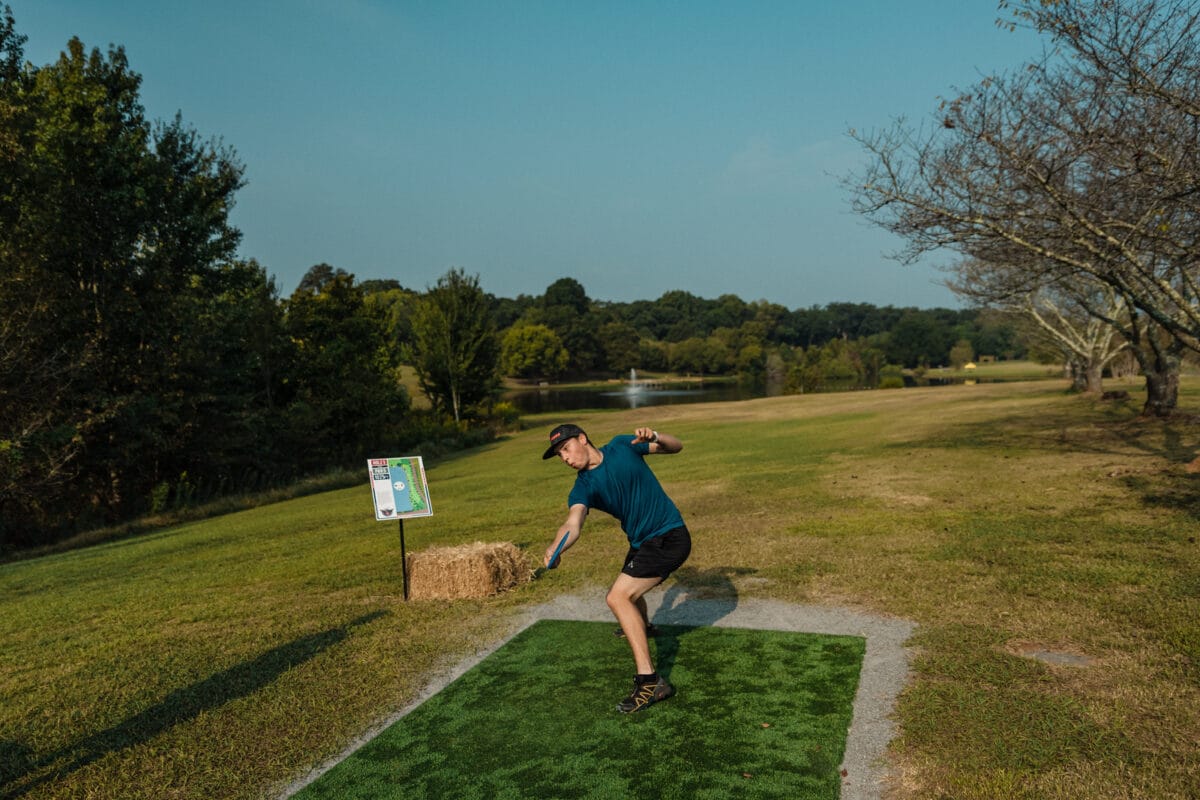
Disc Golf Scoring Terms
What’s great about disc golf scoring is that you probably already know the basics. Much of disc golf scoring and rules mirror traditional golf. Here’s a quick refresher:
Ace: When a player throws their disc in the basket from the tee on his or her first shot, it is an Ace (or hole-in-one). In disc golf you’re much more likely to experience or witness an ace than in traditional golf ace.
Albatross: This rare feat is when a player shoots three strokes under par for a hole, as in taking only 2 throws to complete a par-5 hole. The most famous disc golf albatross in history came from Team Innova member, Philo Brathwaite, at the 2016 Beaver State Fling.
Birdie: A birdie is when players throw one stroke under par for a hole, as in taking only 2 throws to complete a par 3 hole.
Bogey: A bogey is when you shoot one stroke over par for a hole, as in taking 4 throws to complete a par 3 hole.
Double/Triple Bogey, etc: For each stroke over par you shoot for a hole, you take a higher form of bogey. Double bogey = 2 over par, triple bogey = 3 over par and so on.
Eagle: An eagle is when players throw two strokes under par for a hole, as in taking only 3 throws to complete a par 5 hole.
Par: Par is considered to be the number of strokes a proficient disc golfer would score on the hole. Like in traditional golf, par is predetermined for each hole, which could be a par 3, par 4 or par 5.
Stroke: Each throw made on a hole is considered a stroke. Your total throws (starting from your initial tee shot all the way to your successful putt) represent your score for the hole. Your total throws for all holes added together represent your score for the round.
Disc Golf Rule Terms
Like scoring, many of disc golf’s rules will also seem familiar if you’ve played traditional golf, or even a few rounds of mini golf. Here’s a run-through on some of the more common terms.
Casual Relief: Some areas on the disc golf course may be designated as casual relief or free relief areas. This means that if your disc lands in a casual relief area, you may position you lie outside of it without a stroke penalty. It most cases this would be the nearest point of relief behind the area, in line with your throw. Casual relief areas can include casual water like flood prone areas, small streams, and large mud puddles, as well as areas under construction, poison oak/ivy patches or immovable obstructions.
Courtesy Violation: There are many different standards of etiquette when playing disc golf, especially in tournament rounds. If you breach etiquette in an egregious way, you may be assessed a courtesy violation. The first violation will be a warning. Subsequent violations may result in penalty throws and even disqualification. Examples include acts of anger or violence, practice putts during a round, impeding or distracting other players and playing out of turn, just to name a few.
Foot Fault: A foot fault is when you take an illegal stance behind or in front of your disc when throwing your next shot. Foot faults can happen anywhere from the tee box to the putting green. A foot fault inside the putting circle is often called a “falling putt.” Read our blog story on how to avoid foot faults for a better understanding.

Hazard: Some areas on the disc golf course will be designated “hazards.” When discs are in a hazard, you will play your next throw from where the disc lies with a one-stroke penalty. The most common example of a hazard will be a sand trap when playing disc golf on a ball golf course.
Mando: Short for “mandatory.” Some trees, light poles, buildings or other obstacles on the disc golf course may be designated by the course designer and/or tournament director as mandos. Your disc must travel past the correct side of the mando. If not, you will be assessed a one-stroke penalty and then throw from either a drop zone or your previous lie.
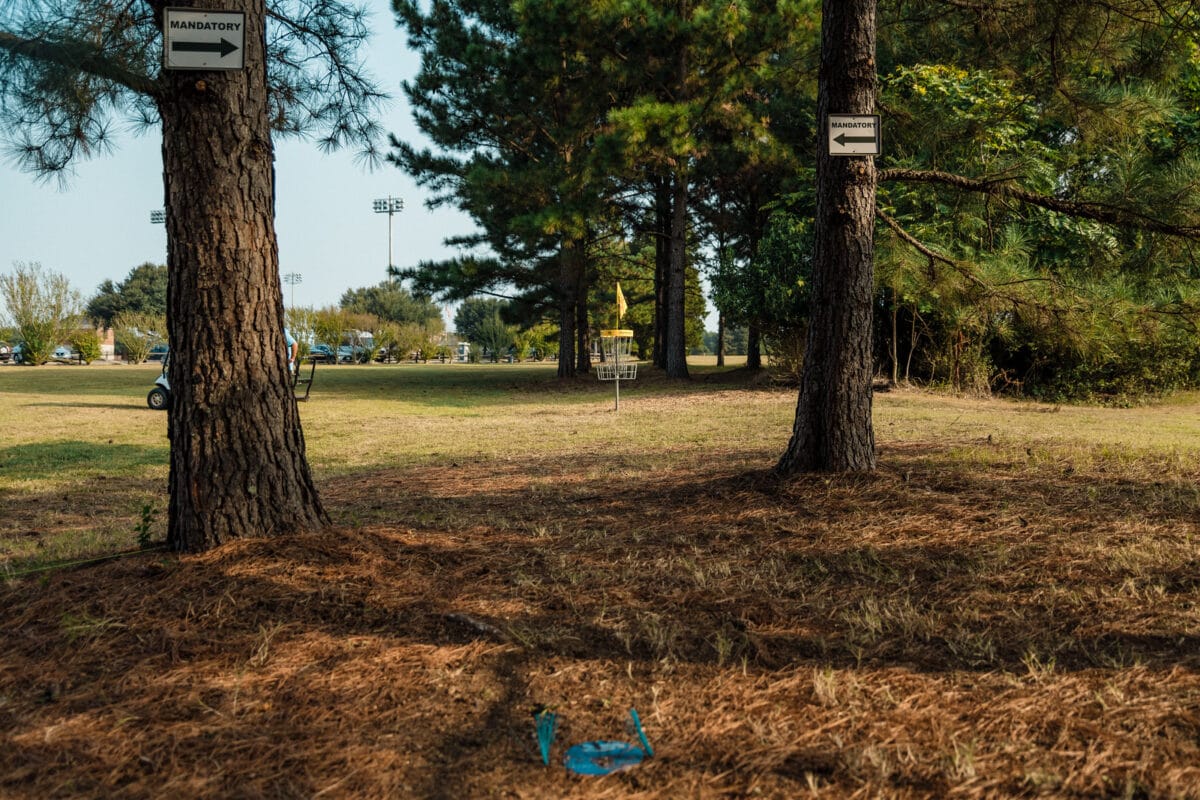
Out of Bounds (OB): Many disc golf holes will have areas that are designated out-of-bounds by the course designer and/or tournament director (TD). They may be marked or denoted in different ways, but the most common examples of OB include lakes, roads, walking paths and golf greens (when playing disc golf on a ball golf course). In most cases, after traveling OB, you’ll place your lie where the disc first crossed into OB.
PDGA (Professional Disc Golf Association): The PDGA is the governing body of organized disc golf play. It has established official rules for competitive play as well as etiquette and scoring procedures. Generally, any competitive round will use the same basic rules and terminology. Visit the Professional Disc Golf Association for a complete list of PDGA rules.
Penalty Stroke: A penalty stroke will add a stroke or strokes to your score for a rule violation that could be the result of an OB, a foot fault, submitting a the wrong, score, etc. Visit the Professional Disc Golf Association for a complete list of PDGA rules and penalties.
Two Meter Rule: This is the rule for when you disc lands in a tree or other elevated object. Although it is often deactivated for tournament play. If the rule is active, a penalty is assessed if your disc gets stuck in such an object that’s two meters or higher from the ground directly below it. Your next throw is positioned on the ground directly below where it became stuck and a one-stroke penalty is added to your score.
Disc Golf Meet Ups
Even though disc golf is not a team sport (in most cases), it’s still very much a social sport. Here’s a sampling of the many kinds of disc golf outings you can participate in and a few other related terms.
Disc Golf Club: This is a group of disc golfers living close together who meet on a regular basis to play organized rounds and events. Most moderate sized towns and cities have at least one club. If not, there’s usually one that meets within driving distance. If you don’t have a local disc golf club, you should look into starting one!
Weekly: Most disc golf clubs will hold some sort of weekly event at the local disc golf course. It’s a chance to get together, meet other disc golfers and have some fun. It’s also a good way to ease yourself into competitive play with formats that are usually much more casual than PDGA sanctioned tournaments.

Monthly: Many disc golf clubs and traveling groups will also have monthly tournaments. These might be bigger than the weekly events, but still another way to gain some competitive experience that will benefit you when you start playing in PDGA tournaments.
PDGA Sanctioned Event: Certain tournaments are sanctioned by the Professional Disc Golf Association (PDGA). These rounds are officially submitted and rated by the PDGA, which is how you earn your player rating. For these events it is recommended to be a PDGA member.
Tournament Director (TD): The TD is the official in charge of a particular disc golf event. They are there to run the event, set the course layout and rules, and oversee any scoring and rule decisions. To run a sanctioned PDGA event (or to be named an “Assistant TD”), you must be a certified rules official through the PDGA.
Safari Layout: A safari layout does not follow the traditional disc golf course layout. It may feature a combination of holes or use completely different angles and distances to various baskets. Some events are made up of special safari holes.
Final 9: Though not as common in tournaments as they used to be, a final 9 is when the top four players in a division will play an additional nine holes to determine the official tournament winner.
Tournament Division Terms
If you play in a PDGA-sanctioned tournament, or any organized event you will see a number of different divisions you can sign up for. Divisions are designed to group players of similar skill, age, and gender for fair competition. There are typically professional divisions playing for cash payouts and amateur divisions playing for trophies or other non-cash prizes. Here are the standard divisions and terms to know.
Divisions: (These terms are listed based on skill level)
- Open (MPO or FPO): This is the top professional level that is “open” to any player who thinks they can compete among the best players in the field. MPO stands for Mixed Professional Open (Open to male and female competitors) and FPO stands for Female Professional Open. Open divisions are eligible for cash prizes and usually contain the most experienced players.
- Advanced (MA1 or FA1): This is the top amateur division for players with excellent disc golf skills.
- Intermediate (MA2 or FA2): This is the intermediate-level amateur division for players with average disc golf skills.
- Recreational (MA3 or FA3): The recreational division is for the occasional disc golfer still learning the game. PDGA tournaments require a player rating of 899 or less to play recreational.
- Novice (MA4 or FA4): This is the lowest-level amateur division, usually for beginners.
Age Protected: There are also age-protected divisions for both professional and amateur players. There are usually divisions for 40+, 50+, 60+ and sometimes higher. These divisions will be denoted by abbreviations like MP40, FP40, MP50, etc. for professionals and MA40, FA40, MA50, etc. for amateurs.

- Juniors: Some events will also have divisions specified for junior players under the age of 18, sometimes broken down even further based on youth age ranges.
Player Rating: This is a skill rating given to all active PDGA members based on PDGA rounds played. Ratings can start at around 700 for inexperienced players and rise to over 1000 for top disc golfers.
Bonus Division Term
Baggers: Short for “sandbaggers”. Those who choose to play in a lower or lesser skilled division that what their true skill exhibits. Generally not a designation players want to achieve.
Game Format Terms
The most common event format is singles stroke play. However, there are many different games and formats you can play for club events and in casual rounds with friends to make things more interesting. Let’s look at some of the different disc golf game formats.
Doubles (Dubs): This is a team format, where you and a partner will play together to create a combined score. There are several different types of dubs formats you can play.
- Alternate Shot Doubles: In this format, you and your partner will alternate shots until each hole is completed.
- Best Shot Doubles: (Sometimes called Captain’s Choice) Similar to a scramble format in ball golf, each player will throw his or her shot from the tee. You choose the better of the two shots and then both throw your next shots from there. You continue until one player has made their disc in the basket. This format produces lower scores, and can also be played with teams of three (trips) or four (quads) for really low scores!
- Best Score Doubles: Each team member plays the entire hole. However, the team takes the best score from either player for each hole.
- Worst-Shot Dubs: This follows the same format as best-shot. However, instead of playing your best shots all the way through a hole, you play your worst shot. This is a fun game format that can also be frustrating (in a good way) because most good shots are nullified.
Match Play: This is a head-to-head format where you essentially earn a point for each hole you win over your competitor (whoever has the lowest score on each hole). You can also “halve” holes with tying scores. The goal is to win more holes than your competitor.
Singles (Stroke play): This is the traditional tournament format where each player plays his or her own stroke play round(s) and the winners are determined by who has the lowest score at the end of the tournament.
Skins Game: This is usually played with a foursome with money on the line. Each hole is worth a “skin” and the goal is to win the most skins. The player with the lowest score on each hole will win the skin. If the low score on a hole is a tie between any two players on the card, the skin will be carried over to the next hole. The following hole will then be worth two skins, and skins can keep carrying over until someone wins a hole outright.
Frequently Asked Questions
What is a disc golf hole called?
A disc golf hole is most commonly called a basket because of the prominent basket tray component that the disc lands in. Although, it is technically not a ‘hole’, it is referred to as one because of the game’s proximity to traditional golf.
Why is it called Hyzer and Anhyzer?
Hyzer and Anhyzer are how disc golfers describe two of the most common release angles in disc golf throws. Hyzer, when the disc is angled down, produces a line similar to golf’s draw while anhyzer, with the disc tilted up, produces a fade type line.
What does the term flippy mean?
Flippy is another way of describing a disc that has an understable flight. When thrown with a right-handed backhand, an understable disc tends to turn to the right before its fade kicks in and brings it back left.
What is a Scooby in disc golf?
A Scooby shot is often another term for a grenade shot in which you essentially make a backhand throw gripping the disc upside down. An overstable disc is used to get a straight up and down flight while a very understable disc can be used to get a corkscrew shape that eventually glides out.
What do you call playing disc golf?
Playing disc is called exactly that – playing disc golf. Disc golf has been the preferred term for the game for decades, which has been steadily moving towards to the mainstream. Disc golf has a vibrant professional scene that is followed by thousands of fans.
Personalized Disc Recommendations
Just answer a few questions and we’ll send you personalized recommendations within 24 hours.
GET PRO TIPS
